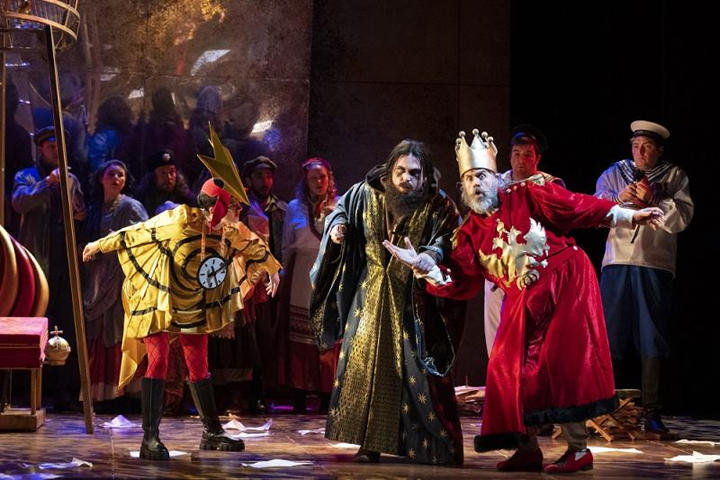| Opera Reviews | 27 April 2024 |
Great fun, if you like that sort of thingby Catriona Graham |
|
Rimsky-Korsakov: The Golden Cockerel |
|
 |
|
|
The Tale of the Golden Cockerel is a mythic fairy tale by Alexander Pushkin, which Rimsky-Korsakov used for The Golden Cockerel, his modernist, satirical opera on Russian imperialism etc circa 1905. In format, it consists of sung dialogue rather than arias, except for the Queen, who has some glorious Big Numbers. It is, if you like that sort of thing, a lot of fun. For English Touring Opera, director James Conway has grabbed the opera by the throat and run with it. Neil Irish’s designs and Rory Beaton’s lighting create primary-coloured principals contrasting with dowdy chorus; the costumes are recognisable from photographs from Russian revolutions in the early 20th century. There is a prologue by the Astrologer who, for some reason, looks vaguely familiar, before Act 1 introduces us to elderly King Dodon (Grant Doyle), not the brightest button in the box, seeking the advice of his sons (Thomas Elwin and Jerome Knox), who are, if anything, dimmer, against his general (Edward Hawkins), who is beyond despair at their stupidity. The situation is an envisaged attack from a neighbouring country Shemakha. Given contemporary events, one cannot but recognise the dilemma facing King Dodon and his subjects. The offer of a golden cockerel (a musically shrill Alys Mererid Roberts) who will alert the King to danger, in exchange for a price to be determined, is too good to miss. It’s all too much for King Dodon, who sends his sons off to battle, while he takes a nap in his onesie, assisted by his nanny Amelfa (Amy J Payne) with whom he appears to have a rather unhealthy relationship, and lots of cuddly toys. While he naps, the chorus also naps, but with added yoga moves. The cockerel, taking up residence in a crow’s nest above the throne, does alert to danger, but too late. When he goes to the battlefield, it is carnage, and both his sons are dead, having followed his instructions to the letter and ending up fighting each other. In the field, however, there is a tent, and that contains his enemy, the neighbouring Queen (Paula Sides) who sets about seducing him in song. Having succeeded, when she arrives for her wedding procession, she has cast off the traditional dress and is elegant in Edwardian-era creamy ivory. The Astrologer arrives, and claims his price – the Queen. In the Epilogue, he claims only he and the Queen are real, all else is illusion, casts off his exotic gown and stands revealed as the monk Rasputin. Quite. With the score offering little opportunity for fine singing, the soloists keep the rather pantomimic action and clowning rolling along, Hawkins in particular an excellent caricature of a moustachio’d general who is rather defeated by the mechanics of a gun. Sides, however, does enjoy some sustained singing, and Doyle has the opportunity to ‘sing badly’ the love-song composed by the King. It’s all very exotic and, at times, the orchestral music is reminiscent of Borodin’s Polotvsian dances from Prince Igor. Conductor Gerry Cornelius and the orchestra, playing a reduced score, conjure up the mythic steppe-lands with all the ambiguity that currently entails. |
|
Photo © Richard Hubert Smith |
|







